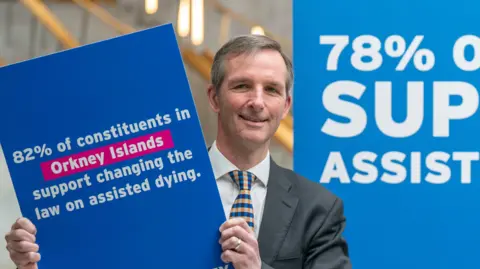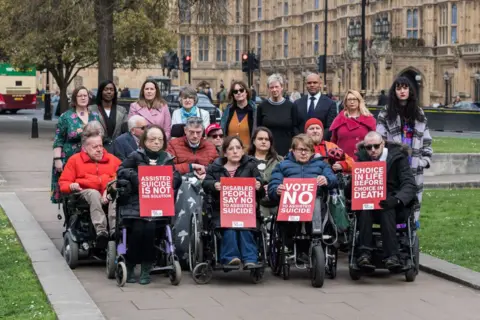MSP to raise assisted dying age from 16 to 18 in bill
 PA Media
PA MediaThe MSP hoping to make assisted dying legal in Scotland says he will raise the minimum age in proposed legislation from 16 to 18.
Liberal Democrat Liam McArthur said he had considered the matter "very carefully" and the change was in line with legislation in the US, Australia and New Zealand.
If the bill passed it would allow a patient to request medical assistance to end their life, but only if they had a terminal illness and had been ruled mentally fit to make the decision by two doctors.
MSPs are scheduled to vote on the broad principles of McArthur's bill at Holyrood on 13 May.
McArthur said he had "reflected on both the evidence provided to the health committee and assisted dying legislation in place in other countries" in making his decision.
He told BBC Scotland News that 18 felt a more suitable age for the legislation.
He said: "Looking at the international examples, where 18 is the age threshold set, that seems a more appropriate age for the thresholds in my bill.
"This is a model that has been in place and worked in Oregon since the late 1990s, and more recently in all of the states in Australia and New Zealand. It commands overwhelming public support in those jurisdictions, as well as the confidence of the medical profession.
"We need to get the detail of any bill here in Scotland right, but there is no reason we can't follow a similar path."
He urged MSPs to vote in favour of the bill and help create "the most compassionate, safe and suitable law for Scotland".
In October last year, First Minister John Swinney said he had "not come to a final view" on the issue but added that the proposed age threshold of 16 was "a very significant issue in my mind" which MSPs will have to "wrestle" with.
MPs in England and Wales voted in favour of a bill to allow assisted dying last year, by 330 votes to 275.
Like the UK parliament, Holyrood will hold a free vote on assisted dying - which means MSPs will not be instructed on how to vote by their parties.
 Getty Images
Getty ImagesThe Scottish bill has proved divisive, and is opposed by the Catholic Church in Scotland and the Scottish Association of Mosques.
Politicians including former First Minister Humza Yousaf and Labour MSP Pam Duncan-Glancy have indicated they would vote against it.
The Church of Scotland is "partially opposed" to the legislation becoming law, but says its official position is currently under review.
Fr Gerry Maguiness, the general secretary of the bishops' conference, told BBC Scotland News the change in age did not affect the Catholic Church's concerns about the bill.
He said: "In terms of the practicalities, it really doesn't make any difference whether you're allowed to kill someone at 16, at 18 or at 80.
"Once you allow to kill, you allow to kill. I would hope MSPs would see sense, that in this legislation we are emerging on a new way of living that makes the vulnerable and elderly very much at risk."
Fr Maguiness added that further funding for elderly care should be the focus for politicians, rather than assisted dying.
'Matter of conscience'
A spokesperson for the Scottish government said it was taking a neutral position on the bill at this stage, and would consider the legislation further if it passed the first vote.
Ally Thomson , the director of the Dignity in Dying Scotland pressure group, said the age change made sense and that "compassion, choice and safety" remained at the heart of the bill.
Alisdair Hungerford-Morgan, the CEO of the charity Right To Life UK said despite the age change the legislation "remains riddled with irredeemable flaws and inadequate safeguards", claiming terminal illness is "defined worryingly loosely".
Earlier this week a Holyrood committee scrutinising the legislation declined to make a recommendation on how MSPs should vote, saying it was a "matter of conscience".
The report from Holyrood's health committee highlighted a number of areas it said required further consideration should the bill progress to stage two.
These include the provision and quality of palliative care, how to ensure the mental capacity of patients opting for assistance to die and the possibility of healthcare professionals being able to "opt-in" to the practice.
A decade ago, a members' bill introduced by independent MSP Margo Macdonald, and taken on by Green MSP Patrick Harvie following her death, was rejected. This followed a 2004 attempt by Liberal Democrat Jeremy Purvis to enact similar legislation.
